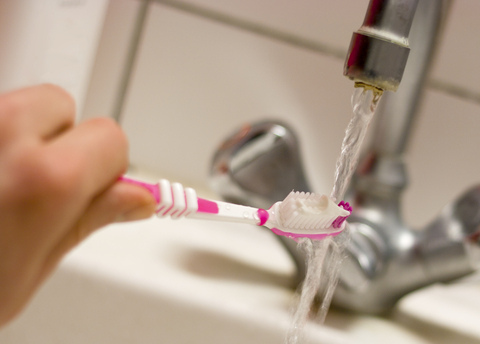I have sensitive teeth. What are my options?
August 14th, 2018

At Erich M. Werner, D.D.S., we have patients coming in asking us why a taste of ice cream or a sip of coffee becomes a painful experience, or why brushing or flossing makes them wince or cringe. The answer, usually, is sensitive teeth. Tooth sensitivity typically occurs when the underlying dentin layer of the tooth is exposed in the oral cavity, and most people experience tooth sensitivity at some point in their lives.
So, why do people experience sensitivity and how do you know if tooth sensitivity is something to be worried about? The most common cause of the sensitivity is exposure of the dentin, which is the layer surrounding the tooth’s nerve. Contributors to tooth sensitivity include teeth whitening and dental work such as fillings, periodontal treatment, and the placement or adjustment of braces. These are temporary and should be of no concern.
Permanent hypersensitivity, however, may require treatment at Erich M. Werner, D.D.S.. The first step is to determine the cause, and that begins with a visit to our Los Gatos, CA office.
The reasons your teeth may become sensitive vary, but possible causes include:
- Tooth decay (cavities) near the gum line
- Cracked or fractured teeth
- Fillings that are worn
- Gum (periodontal) disease, or recession of the gums
- Worn tooth enamel
- Brushing too hard
- Consuming acidic foods
Dr. Werner and our team at Erich M. Werner, D.D.S. want you to know that sensitive teeth can be treated, and the type of treatment will depend on what is causing the sensitivity. Dr. Werner may suggest one the following treatments:
- Desensitizing toothpaste, which contains ingredients that seal off the microtubules inside the exposed dentin to reduce tooth sensitivity
- Fluoride gel, which strengthens compromised tooth enamel, helps prevent tooth decay, and decreases hypersensitivity of the teeth
- A crown, inlay, or bonding, which is used to treat tooth decay and prevents sensitivity
- A surgical gum graft. If gum tissue has been lost from the root, this procedure will protect the root and reduce sensitivity.
- Root canal: If you are experiencing severe and persistent sensitivity which cannot be treated by other means, Dr. Werner may recommend you undergo a root canal to eliminate the problem.
If you are experiencing tooth sensitivity, give us a call today so that Dr. Werner can provide you with some much-needed relief!




 Website Powered by Sesame 24-7™
Website Powered by Sesame 24-7™